Stapleton International Airport
| Stapleton International Airport | |||||||||||||||||||||||||||||||
|---|---|---|---|---|---|---|---|---|---|---|---|---|---|---|---|---|---|---|---|---|---|---|---|---|---|---|---|---|---|---|---|
|
Stapleton highlighted on a map of Denver neighborhoods | |||||||||||||||||||||||||||||||
|
IATA: | |||||||||||||||||||||||||||||||
| Summary | |||||||||||||||||||||||||||||||
| Airport type | Public, Defunct | ||||||||||||||||||||||||||||||
| Serves | Stapleton, Denver, Colorado, United States | ||||||||||||||||||||||||||||||
| Location | Stapleton, Denver, Colorado | ||||||||||||||||||||||||||||||
| Hub for | |||||||||||||||||||||||||||||||
| Coordinates | 39°45′38.6″N 104°53′31.1″W / 39.760722°N 104.891972°WCoordinates: 39°45′38.6″N 104°53′31.1″W / 39.760722°N 104.891972°W | ||||||||||||||||||||||||||||||
| Map | |||||||||||||||||||||||||||||||
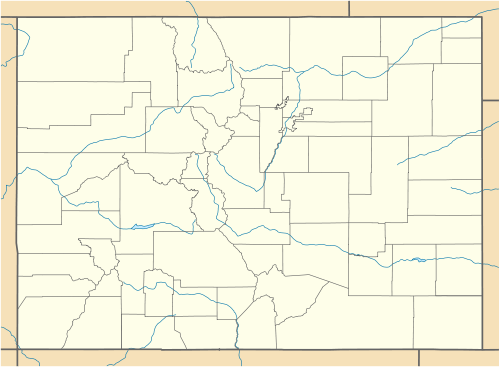 DEN Location within Colorado | |||||||||||||||||||||||||||||||
| Runways | |||||||||||||||||||||||||||||||
| |||||||||||||||||||||||||||||||
Stapleton International Airport was the primary airport serving Denver, Colorado, United States from 1929 to 1995. At different times it served as a hub for Continental Airlines, the original Frontier Airlines, People Express, Trans World Airlines (TWA), United Airlines and Western Airlines. Other airlines with smaller hub operations at Stapleton included Aspen Airways, the current version of Frontier Airlines and Rocky Mountain Airways with all three of these air carriers being based in Denver at the time.[1]
In 1995, Stapleton was replaced by Denver International Airport. It has since been decommissioned and the property redeveloped as a retail and residential neighborhood.
History
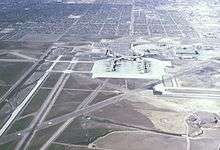
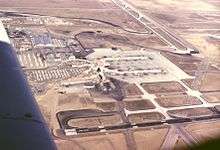
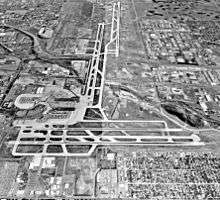
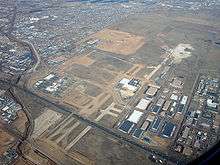
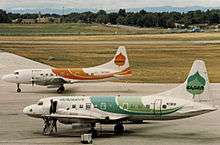
Stapleton opened on October 17, 1929, as Denver Municipal Airport. Its name became Stapleton Airfield after a 1944 expansion, in honor of Benjamin F. Stapleton, the city's mayor most of the time from 1923 to 1947, and the force behind the project when it began in 1928. Concourse A, the original building from 1929, was still in use when the airport closed. The airport was created by Ira Boyd Humphreys in 1919.
The March 1939 Official Aviation Guide shows nine weekday departures: seven United and two Continental. The April 1957 shows 38 United, 12 Continental, seven Braniff, seven Frontier, seven Western, five TWA and one Central. The jet age arrived during the summer of 1959 when Continental began operating Boeing 707 jetliners into Stapleton.
Runway 17/35 and a new terminal building opened in 1964. Concourse D was built in 1972. After deregulation three airlines had hubs at Stapleton: (Frontier Airlines, Continental Airlines, and United Airlines). To combat congestion runway 18/36 was added in the 1980s and the terminal was again expanded with the $250 million (or $58 million according to the New York Times[2]) 24 gate Concourse E opening in 1988, despite Denver's replacement airport already under construction.[3][4][5] When it closed in 1995 Stapleton had six runways (2 sets of 3 parallel runways) and five terminal concourses.
1938, 1956 and 1984 airport diagrams
In the early 1980s Stapleton was a hub for four airlines—United, Continental, Frontier and Western—making it one of the most competitive markets in the United States. Southwest Airlines and People Express tried low-cost service to Denver in the mid-1980s, but Southwest withdrew and People Express was acquired by Continental.[6]
In September 1982 the first revenue flight of the Boeing 767 arrived at Stapleton from O'Hare International Airport in Chicago.
During the energy boom of the early 1980s, several skyscrapers were built in downtown Denver, including Republic Plaza (Denver's tallest at 714′). Due to Stapleton's location 3 miles (4.8 km) east of downtown, the Federal Aviation Administration imposed a building height restriction of 700'-715' (depending on where the building was). This allowed an unimpeded glide slope for runways (8L/26R) and (8R/26L). The height restriction was lifted in 1995, well after the city's skyscrapers had been erected.
Stapleton Airport was the site for Ted Fujita's studies of microbursts.
Continental Airlines closed its Stapleton pilot and flight attendant bases in October 1994, reducing operations and making United Airlines the airport's largest carrier.[7] On February 25, 1995, George Hosford, Air Traffic Controller, cleared the last plane (Continental Flight 34, to London Gatwick) to depart from Stapleton International Airport. This would also mark the end of Continental Airlines' use of Denver as its hub.
Decommissioning
By the 1980s, plans were under way to replace Stapleton with a new airport. Stapleton was plagued with a number of problems, including:
- inadequate separation between runways, leading to extremely long waits in bad weather
- little or no room for other airlines that proposed/wanted to use Stapleton for new destinations (an example of this was Southwest Airlines)
- a lawsuit over aircraft noise, brought by residents of the nearby Park Hill community
- legal threats by Adams County, Colorado, to block a runway extension into Rocky Mountain Arsenal lands
The Colorado General Assembly brokered a deal in 1985 to annex a plot of land in Adams County into the city of Denver, and use that land to build a new airport. Adams County voters approved the plan in 1988, and Denver voters approved the plan in a 1989 referendum.
After weeks of delays, a Continental Airlines flight, with a destination of London Gatwick, was the last flight to depart Stapleton. The airport was then shut down. A convoy of vehicles of many kinds (rental cars, baggage carts, fuel trucks, etc.) traveled to the new Denver International Airport (DEN), which officially opened for all operations the following morning.[8]
The runways at Stapleton were then marked with large yellow "X"s, which indicated it was no longer legal or safe for any aircraft to land there. The IATA and ICAO airport codes of DEN and KDEN were then transferred to the new DIA, to coincide with the same changes in airline and ATC computers, to ensure that flights to Denver would land at the new DIA.[9]
Originally Denver sought tenants for Stapleton's terminal and concourses, but these buildings proved ill-suited for alternative uses. A July 1997 hail storm punched roughly 4,000 holes in the roofs of the old terminal and concourses, causing severe water damage, which compelled the city to tear them down. However, the airport's 12-story control tower will be retained as a monument to the airport's history and is likely to have an added observation deck for tourists.[2]
All of Stapleton's airport infrastructure has been removed, except for the former control tower. The final parking structure was torn down to make room for the "Central Park West" section of the housing development in May 2011.
Facilities
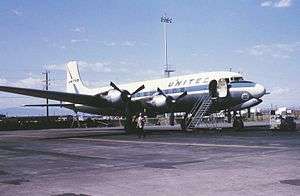
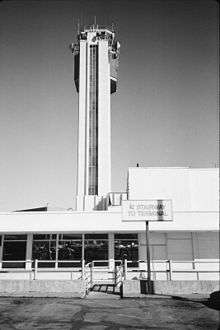
At the time of its decommissioning, the airport had the following runways:
- 17R/35L (11,500 ft)
- 17L/35R (12,000 ft)
- 8L/26R (8,599 ft)
- 8R/26L (10,004 ft)
- 7/25 (4,871 ft)
- 18/36 (7,750 ft)
The terminal had five concourses:
- Concourse A – Commuter flights, Mesa Air Group, United Airlines
- Concourse B – United Airlines
- Concourse C – Continental Airlines, Frontier Airlines, Mexicana Airlines
- Concourse D – Continental Express, Delta Air Lines, MarkAir, Pan American World Airways, Trans World Airlines
- Concourse E – America West Airlines, American Airlines, Northwest Airlines, Sun Country, USAir
Continental Airlines was once headquartered in Stapleton, moving there in October 1937.[10] Airline president Robert F. Six arranged to have the headquarters moved to Denver from El Paso, Texas because he believed that the airline should have its headquarters in a large city with a potential base of customers.[11] At a 1962 press conference in the office of Mayor of Los Angeles Sam Yorty, Continental Airlines announced that it planned to move its headquarters to Los Angeles in July 1963.[12]
Redevelopment
While Denver International was being constructed, planners began to consider how the Stapleton site would be redeveloped. A private group of Denver civic leaders, the Stapleton Development Foundation, convened in 1990 and produced a master plan for the site in 1995, emphasizing a pedestrian-oriented design rather than the automobile-oriented designs found in many other planned developments.
Accidents and incidents
Several major air crashes involved Stapleton as the origin or destination airport, with four evidently occurring at Stapleton.
At Stapleton
- On July 11, 1961, United Airlines Flight 859, a DC-8-12 tail number N8040U, was destroyed after landing. Asymmetric thrust on engines 1 & 2 (left wing) forced a loss of control on the runway. The aircraft struck a maintenance vehicle, killing the driver. In the ensuing disaster, 17 of the DC-8's 122 occupants died.
- On August 7, 1975, Continental Airlines Flight 426 crashed due to windshear after taking off and climbing to 100 feet (30 m) on runway 35L. Nobody was killed in the accident.
- On November 16, 1976, a Texas International DC-9-10 aircraft stalled after takeoff at Stapleton and crashed. The 81 passengers and 5 crewmembers suffered a total of 14 injured, but there were no deaths.
- On November 15, 1987, Continental Airlines Flight 1713, a DC-9-14 jetliner bound for Boise, Idaho, crashed on takeoff at Stapleton during a snowstorm. The probable cause of the crash was the failure of the flight crew to have the aircraft de-iced prior to take-off and the over-rotation of the aircraft on take-off. Twenty-eight of the plane's 82 occupants were killed.
References
- ↑ http://www.departedflights.com, Feb. 15, 1985 Aspen Airways route map; Jan. 16, 1995 Frontier Airlines route map; Dec. 13, 1985 Rocky Mountain Airways route map
- 1 2
- ↑
- ↑
- ↑
- ↑ "Weakening of airlines' "hub and spoke" model could imperil Denver airport". Denver Post. 17 August 2004. Retrieved 10 December 2013.
- ↑ Yates, Ronald (8 July 1994). "Continental To Shutter Pilot, Attendant Bases In Denver". Chicago Tribune. Retrieved 10 December 2013.
- ↑
- ↑ Freeman, Stapleton International Airport
- ↑ Kasel, Carol. "CONTINENTAL AIRLINES: THE DENVER YEARS." Rocky Mountain News. October 30, 1994. Retrieved January 24, 2010.
- ↑ "The Company." Continental Airlines Magazine. July 2009. Retrieved February 8, 2010.
- ↑ "Continental Airlines to Move Its Main Offices Here From Denver." Los Angeles Times. August 16, 1962. B11. Retrieved January 24, 2010.
External links
| Wikimedia Commons has media related to Stapleton International Airport. |
![]() This article incorporates public domain material from the Air Force Historical Research Agency website http://www.afhra.af.mil/.
This article incorporates public domain material from the Air Force Historical Research Agency website http://www.afhra.af.mil/.
- Airport history
- Stapleton Airport Photographs
- Airport diagrams: 1938, 1956, and 1959
